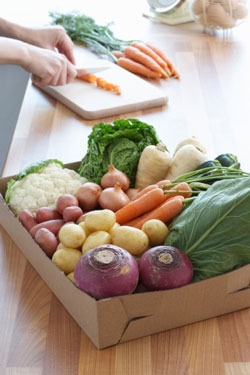It’s that time of year, when many of us make those New Year’s Resolutions. So in the spirit of the season, and our focus on the overall wellbeing of our patients, here are 10 things to do in the kitchen for a healthier you this year. Because what you eat is more important than exercise. Don’t get us wrong – exercise is vital, but no amount of exercise can overcome poor nutrition habits.

Eat real food
1) Take time to meal plan, shop, prep, and cook.
A weekly meal plan that pre-determines your breakfasts, lunches, dinners, and snacks makes it much easier to stay on track, make healthy choices, and prepare for a busy week. Pre-cooking some of your meals, or dusting off that slow cooker, will also help from a convenience standpoint. Also, eat smaller amounts, more often. Instead of three large meals a day and a couple of unhealthy snacks, try to eat smaller healthy meals four to six times a day and include protein in every one. This keeps your mood, hormones, and energy levels on a more even keel throughout the day, and helps with weight loss, if that’s a goal.
2) Eat lean protein (at every meal if possible), like you find in turkey and chicken breast, and fresh eggs.
Protein is critical to maintain and build lean muscle. The more lean muscle you have, the more energy your body needs, and the faster it burns calories (and fat). Also, eat fish more often, which is packed with those healthy omega-3 fatty acids.
3) Eat fresh veggies and greens (at every meal if possible).
This is where you should turn for your main sources of key vitamins, minerals, and nutrients.
4) Eat unsalted seeds and nuts.
Nuts have fat, but it’s good fats that help to burn body fat. Just eat them in moderation.
5) Eat more berries, but less of other fruits.
Unlike most fruits, berries do not contain high levels of the sugar fructose that can spike your blood sugar. By the same token, cut back on the fruit juices – even “100 per cent fruit juice” can be higher in sugar than a soft drink. Sugar is still sugar, whatever the source.
6) Cut back on the milk.
Milk is also naturally high in sugar. Studies have linked it to increased risk of diabetes, some cancers, and even bone fractures with age. You don’t need to drink milk to get your calcium – that’s what leafy green veggies are for.
7) Cut out the sugar.
Must we say more? Sugar has come to be recognized as the single greatest threat to our health versus fats. The key thing is to recognize that sugar comes in many forms – not just that white granulated stuff you spoon into your coffee – dairy milk, fruits and fruit juices, and even the “simple” carbohydrates found in processed white flours.
8) Cut out packaged, processed, and fast foods.
This includes breakfast cereals, frozen entrees, crackers, potato chips, and candy bars. These are prime sources of that unwanted sugar, as well as excessive salt and bad fat. They will also have poorer nutritional value than whole foods – you’re eating more “empty calories” that will end up stored in your body as fat.
9) Eat the right starches.
Starches are carbohydrates and forms of sugar. Now, your body does need some carbohydrates for fuel, but eat the right ones – whole grains like rice, oats, and quinoa, and more complex carbohydrates like potatoes and cassava (manioc). Avoid processed foods made with white flour, like breads, baked goods, and pasta. Again, moderation is key. It depends on your metabolism, level of physical activity, and weight management goals. The fewer carbohydrates you eat throughout the day, the more your body is forced to burn fat as fuel.
10) Avoid gluten.
Gluten is the protein in wheat flour that gives it the sticky stretch to rise with yeast. It’s also found in rye and barley. Even oatmeal can contain it because of crop rotations that leave dropped seeds from last year’s wheat crop sprouting in this year’s oats. Gluten is a source of obvious gastro-intestinal distress and even life-threatening allergies for some people. But studies have also linked it to persistent low-levels of bowel inflammation in a majority of people. This chronic “smoldering” inflammation, can contribute to the onset of malignant diseases such as cancer.
In short: Eat real food …
Eat real food, and “earn your carbohydrates” (meaning on the days you exercise, you can have more carbohydrates in your diet). If you don’t exercise, but consume extra carbohydrates/calories, they will be stored as fat.
And go to bed
This is the scourge of our busy modern lives. We just don’t go to bed early enough, and stress keeps us from getting a good sleep when we do. Lack of sleep is itself a form of stress. Elevated stress levels contribute to weight gain and hanging on to those unwanted pounds. Studies have also shown that sleep deprivation deepens our cravings for high-carbohydrate, high-fat foods. People who are chronically short of sleep are 30 per cent more likely to be obese.
